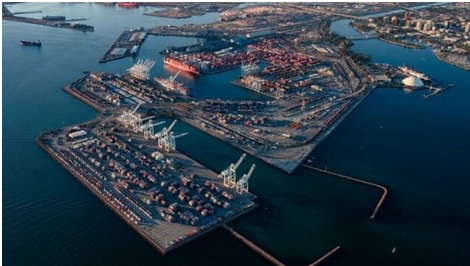
The Southern California ports at Los
Angeles and Long Beach both reported a strong start to 2024 highlighting the
belief the ports are recovering from the downturns in the economy last year and shippers rerouting due to fears
of labor disruptions during the longshore workers' contract negotiations.
Executives at both ports expect continued strength in imports moving into the
year while however highlighting that the ports still have capacity for
near-term growth.
The Port of Los Angeles called
January 2024 a “great start” with what it termed “impressive” results both for its
import and export volumes. January 2024, they said, was the port’s
second-best January on record, falling short only of January 2022 which was
during the peak surge in volumes in the pandemic. Unlike 2022, when container
vessels were stacked up outside the port, they also highlight an orderly flow
with the Marine Exchange of Southern California which manages vessels in the
San Pedro Bay area repeatedly reporting no congestion or labor delays.
Executives
at both the ports of Los Angeles and Long Beach highlighted a strong and early
restocking effort as helping to drive import volumes. Cargo owners are actively
replenishing said the Port of Los Angeles while the Port of Long Beach said
that retailers stocked their warehouses in January ahead of the typical
slowdown around the Lunar New Year holiday. Los Angeles also pointed to the
strength of the U.S. economy and anticipated consumer demand which they believe
will continue to fuel growth in volumes.
Asked
about the impact that the diversions from the Red Sea and the reduction in
transits at the Panama Canal, Los Angeles’ Executive Director Gene Seroka
however denied the reports that these issues were driving the strong volume
growth. He said they had so far only seen a small uptick from shippers but said
“it could change.”
The Port of Los Angeles reported its
sixth consecutive month of year-over-year gains in total volume with an 18
percent overall increase versus January 2023. Imports were up 19 percent to nearly
442,000 TEU and exports increased 23 percent to more than 126,000 TEU.
”It was
the eighth consecutive month of year-over-year gains in exports,” said Seroka.
He called the performance a “welcome rebound after more than two years of very
low export volumes.”
Long Beach reported a decline in
exports however by 18 percent, but an overall gain in volume of 17.5 percent.
Imports increased 23.5 percent to more than 325,000 TEUs. “We are ready to grow our volumes and
hope to see continued growth through 2024 as we gradually recapture market
share,” said Port of Long Beach CEO Mario Cordero. Neighboring Los Angeles
shared a similar view while noting the port’s terminals are currently operating
at 75 to 80 percent of capacity. Seroka highlighted that the SoCal ports have
increased their Asian market share by four percent since the longshore workers'
contract was ratified in August 2023.
Despite expecting a slowdown in
volumes in late February and into March reflecting the Lunar New Year Holiday
which is underway in Asia this week, Los Angeles is forecasting a strong first
quarter. Seroka
told reporters during his monthly briefing that he expects “robust volume in
February,” forecasting more than 700,000 TEU. For the first calendar quarter of
2024, the Port of Los Angeles forecasts an overall gain of 20 percent in volume
or a total of more than 2.2 million TEU.